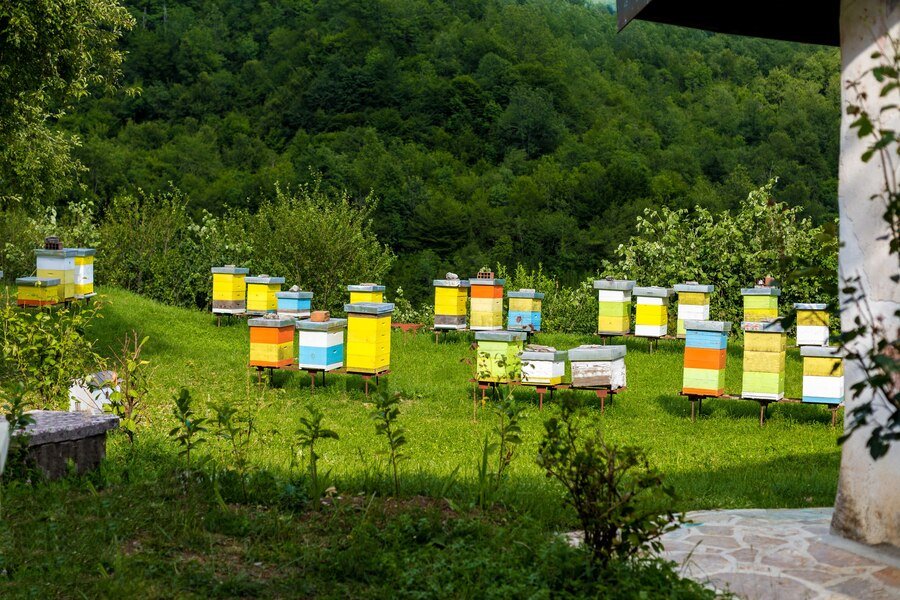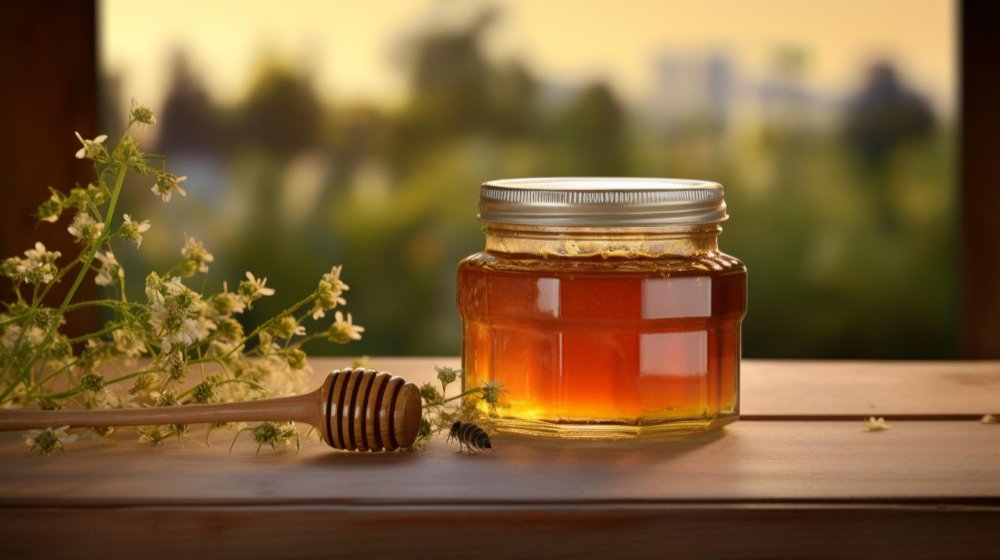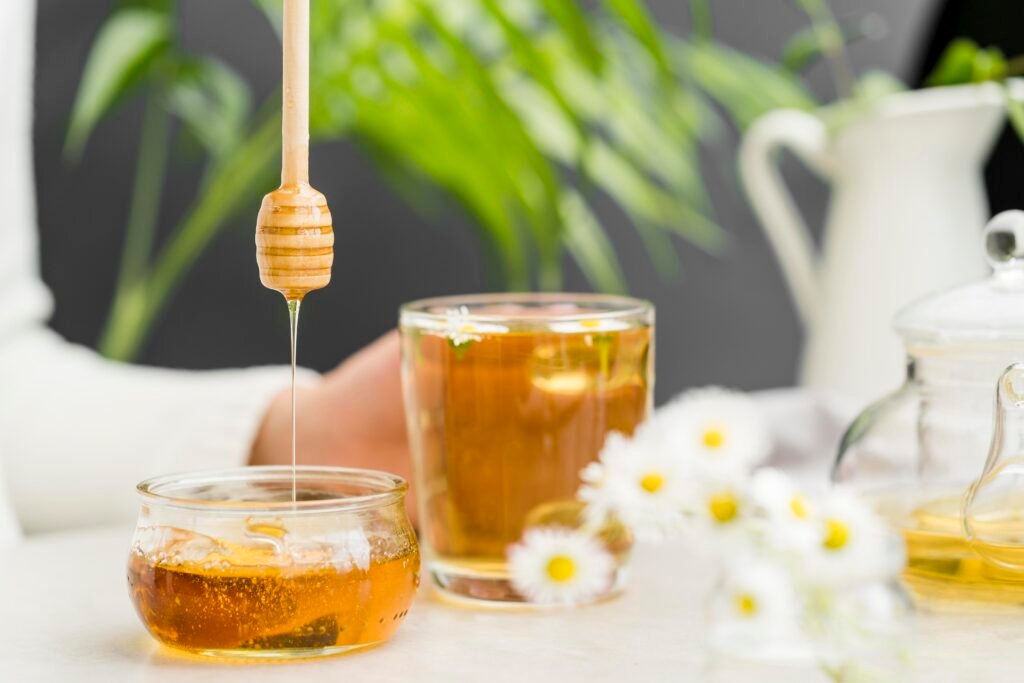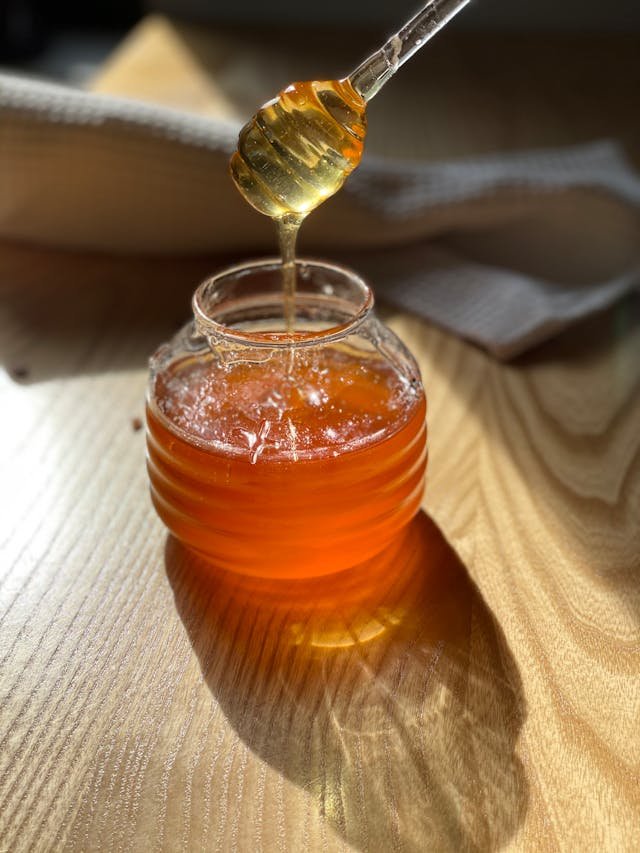Meadow honey is a unique and treasured type of honey that comes from the nectar of wildflowers found in meadows. This delightful honey is crafted by hardworking bees. They gather nectar from a variety of flowers in these natural habitats. Meadow honey has a light, sweet taste. It’s famous for its health benefits. Meadow honey is packed with nutrients. It has been valued for centuries for its healing properties. Its unique flavor and natural goodness make it a popular choice for those seeking tasty, healthy honey.
How is Meadow Honey Made?

Role of Honey Bees
Honey bees are amazing creatures. They play a big role in making meadow honey. These bees fly from flower to flower in the meadow, collecting nectar. This nectar is a sweet liquid that flowers produce. Honey bees suck up nectar with their long tongues. They store it in a special stomach called the “honey stomach.” When it’s full, the honey bee flies back to the hive.
Process of Nectar to Honey
Once the honey bees are back at the hive, they pass the nectar to other bees. These bees chew the nectar for about half an hour, breaking it down into simple sugars. The bees then spread the nectar in the honeycomb, and they fan it with their wings to evaporate the water from it. This thickens the nectar and turns it into honey. Once the honey is ready, the bees seal it with wax to keep it fresh. That’s how meadow honey is made!
Benefits of Meadow Honey
Meadow honey is packed with numerous health benefits, making it a valuable addition to your diet.
- Rich in Antioxidants
Meadow honey has many antioxidants. They protect the body from oxidative stress. These antioxidants help fight free radicals. They lower the risk of chronic diseases, like heart disease and cancer. Regularly eating meadow honey can boost health. It helps the body’s defenses.
- Natural Antiseptic Properties
One of the remarkable benefits of meadow honey is its natural antiseptic properties. It has been used for centuries as a natural remedy for wound care. Meadow honey can help minor cuts, scrapes, and burns. It prevents infections and speeds healing. Honey’s enzymes produce hydrogen peroxide, which kills bacteria. So, it is a natural antiseptic.
- Relief from Allergies
Meadow honey is believed to help alleviate symptoms of seasonal allergies. Eating small amounts of raw meadow honey may help. It may reduce allergy symptoms, like sneezing and itching. It may also build a tolerance to pollen. Many people find relief during allergy season by using meadow honey. Scientific evidence is still emerging.
- Supports Digestive Health
Meadow honey has prebiotic properties. They support the growth of good gut bacteria. This can aid in digestion and promote a healthy digestive system. Also, honey’s natural enzymes can soothe an upset stomach and improve gut health.
- Boosts Energy Levels
Meadow honey is a natural source of carbs. It provides a quick, easy-to-digest energy boost. Honey’s natural sugars, like glucose and fructose, are quickly absorbed into the bloodstream. This makes it great for athletes or anyone needing a quick boost. Unlike refined sugars, honey provides a steady energy boost. It helps prevent energy crashes.
- Immune System Support
Regular consumption of meadow honey can help strengthen the immune system. Its antimicrobial and anti-inflammatory properties help the immune system. They aid in fighting infections and illnesses. Meadow honey can boost your health in cold and flu season.
- Skin Health
Meadow honey is not only beneficial when consumed but also when applied topically. Its moisturizing and soothing properties make it a popular ingredient in skincare products. Honey can help hydrate the skin, reduce inflammation, and promote a clear complexion. It is also used in natural remedies to treat acne, eczema, and other skin conditions.
Meadow Honey vs. Other Types of Honey

Meadow honey is unique among honeys. It has distinct traits and benefits.
- Flavor Profile
Meadow honey is usually light and floral. Its flavor is complex and varies with the meadow’s flowers. In contrast, clover and acacia honeys have milder, more uniform flavors. Clover honey is sweet and mild. Acacia honey is delicate and subtly sweet.
- Nutritional Content
Meadow honey, especially when raw, is very nutritious. It has all its natural vitamins, minerals, and enzymes. Other honeys have nutritional benefits, but their nutrients vary by flower source. Manuka honey is famous for its high methylglyoxal (MGO) levels. They give it strong antibacterial properties.
- Antioxidant Levels
Meadow honey is high in antioxidants. They protect the body from oxidative stress. This is similar to other dark honeys, like buckwheat honey. They are also known for their high antioxidant content. However, the antioxidant levels can differ. They depend on the flowers the bees visit. This gives meadow honey a unique antioxidant profile.
- Health Benefits
Meadow honey has many health benefits, like other honeys. It is a natural antiseptic. It helps with seasonal allergies and boosts energy. Some honey, like manuka, is prized for its medicinal properties. It can heal wounds and fight bacteria, thanks to its unique compounds.
- Versatility
Meadow honey is versatile. It works as a sweetener and in recipes. But, other honeys might be better for specific uses. For example, buckwheat honey’s robust flavor makes it ideal for baking, while acacia honey’s mild taste suits delicate dishes.
In summary, meadow honey is a great all-rounder. It has a floral flavor and health benefits. Other honeys have unique traits. They are better for specific uses and health needs.
Uses of Meadow Honey

In the Kitchen
Meadow honey is a versatile ingredient in the kitchen. You can use it in many ways. It’s a great natural sweetener for tea, coffee, and smoothies. You can also drizzle it over yogurt, oatmeal, or pancakes for a touch of sweetness. Meadow honey can be used in baking, too. It adds a rich flavor to cakes, cookies, and bread.
Medicinal Properties
Meadow honey has been used as a natural remedy for centuries. It’s known for its soothing properties. If you have a sore throat, a spoonful of meadow honey can help relieve the pain. It’s also great for boosting the immune system. Some people take a spoonful of meadow honey every day to stay healthy and fight off colds
Sustainable Honey Production
Importance of Bees in the Ecosystem
Honey bees are essential to our ecosystem. They do more than just make honey. Bees play a crucial role in pollinating flowers, including the wildflowers in meadows. Without bees, many of the plants we rely on for food would not be able to grow. By supporting sustainable honey production, you are also supporting the health of the environment.
Supporting Ethical Honey Production
When buying meadow honey, it’s important to choose products from ethical producers. Ethical beekeepers take good care of their bees and the environment. They make sure that their honey production practices are sustainable and do not harm the bees. By choosing to buy from local and ethical beekeepers, you can enjoy meadow honey while also supporting the health of the planet.
How to Choose the Best Meadow Honey
Look for Raw Honey
When buying meadow honey, look for raw honey. Raw honey is honey that has not been heated or processed. It retains all its natural nutrients and health benefits. Raw meadow honey is also more flavorful than processed honey. It’s the best choice if you want to get the most out of your honey.
Check for Local Producers
It’s also a good idea to buy meadow honey from local producers. Local honey is often fresher and more flavorful. It also supports local beekeepers and the local economy. Plus, buying local honey can be better for the environment because it doesn’t have to be transported long distances.
Conclusion
Meadow honey is a true gift from nature. It’s made by honey bees from the nectar of wildflowers in meadows. This honey is not only delicious but also packed with health benefits. It’s rich in antioxidants, can be used as a natural antiseptic, and may even help with allergies. Meadow honey has a unique flavor that sets it apart from other types of honey. It’s a versatile ingredient in the kitchen and has been used as a natural remedy for centuries. Whether you’re looking for a tasty sweetener or a natural health booster, meadow honey is a great choice. So next time you’re looking for honey, consider choosing meadow honey – you won’t be disappointed!
References:
- Bee City. (n.d.). How Do Bees Make Honey? Retrieved from beecitycanada.org/how-do-bees-make-honey
- Healthline. (2021). Antioxidants in Honey: The Health Benefits. Retrieved from healthline.com/nutrition/antioxidants-in-honey
- Medical News Today. (2021). Honey as a Natural Antiseptic. Retrieved from medicalnewstoday.com/articles/318344
- WebMD. (2020). How Raw Honey Helps Allergies. Retrieved from webmd.com/allergies/ss/slideshow-honey-allergies
- Healthline. (2021). The Nutritional Content of Raw Honey. Retrieved from healthline.com/nutrition/raw-honey-benefits
- Epicurious. (n.d.). Uses of Honey in Cooking and Baking. Retrieved from epicurious.com/expert-advice/how-to-cook-with-honey-article
- Mayo Clinic. (2020). The Healing Properties of Honey. Retrieved from mayoclinic.org/tests-procedures/cupping-therapy/about/pac-20385036
- Greenpeace. (n.d.). Why Bees Matter and How You Can Help. Retrieved from greenpeace.org/international/story/43480/why-bees-matter-and-how-you-can-help-save-them
- The Spruce Eats. (2021). Choosing the Best Honey. Retrieved from thespruceeats.com/how-to-choose-the-best-honey-5086172
FAQs about Meadow Honey
- What makes meadow honey unique?
Meadow honey is unique due to its origin from the nectar of wildflowers in meadows. Its light, floral flavor and distinct taste come from the variety of flowers bees visit. Meadow honey is prized for its high antioxidants and health benefits. These qualities set it apart from other honeys.
- How can I use meadow honey in cooking?
Meadow honey is a versatile ingredient in the kitchen. It can be used as a natural sweetener in tea, coffee, and smoothies. It also adds a delicious touch when drizzled over yogurt, oatmeal, or pancakes. Additionally, it enhances the flavor of baked goods like cakes, cookies, and bread.
- Is meadow honey good for allergies?
Meadow honey is believed to help with seasonal allergies. Eating small amounts of raw meadow honey may help. It may build a tolerance to pollen and reduce allergy symptoms, like sneezing and congestion. While some people find relief, scientific evidence is still developing, so individual results may vary.
- Can meadow honey be used for wound care?
Yes, meadow honey has natural antiseptic properties and has been used for centuries in wound care. Its enzymes produce hydrogen peroxide, which has antibacterial effects. Applying meadow honey to minor cuts, scrapes, or burns can help prevent infections and promote faster healing.
- How can I choose the best meadow honey?
To choose the best meadow honey, look for raw honey, which has not been heated or processed and retains its natural nutrients. Raw meadow honey is more flavorful and nutritious. Additionally, consider buying from local producers to ensure freshness and support local beekeepers.



